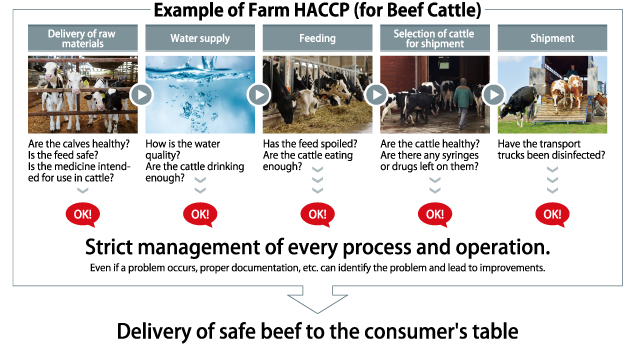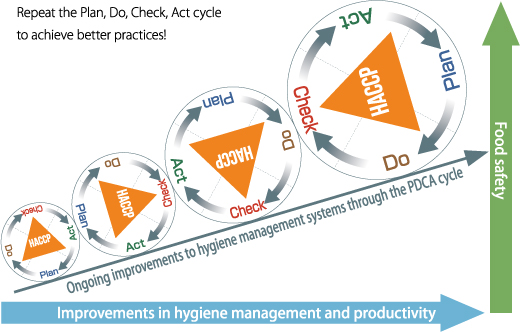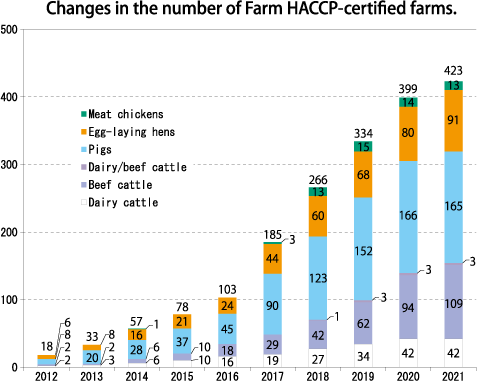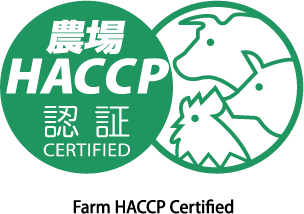Basic Information on Farm HACCP
The basic principle of food products is safety. In light of past incidents that have threatened food safety, such as BSE and mass food poisonings caused by E. coli O-157, and in line with the view that consistent hygiene management is required at each stage from farms to food processing plants, distribution, and the consumer’s table, efforts are now being made to ensure food safety at every step of the process. Farm HACCP is an effective system that ensures the safety of livestock products used as raw materials for food through strict control of production processes on farms.
HACCP’s origins in space food

First, let us talk about HACCP, which forms the basis of Farm HACCP.
HACCP is a method of food safety management that was first proposed by NASA during the Apollo program in the 1960s. It would be a very serious problem if, after traveling into space, someone suffered from food poisoning or if there was not enough to eat because the food had gone bad, so it was vital to make sure that the food was safe. It is now internationally recognized and has been adopted in the food manufacturing industry around the world.
HACCP controls the entire manufacturing process, from raw materials to finished product

HACCP is an acronym for Hazard Analysis and Critical Control Points. It is a hygiene management system that guarantees safety by identifying what kind of hazards and where they exist in ingredients, materials, and the food production process as a whole, determining what kinds of controls can be used to avoid them, then documenting, implementing, and keeping records accordingly.
For example, when manufacturing processed meat products in a food processing plant, the raw meat ingredients may carry bacteria (hazards). However, it is known that bacteria can be reliably killed by heating at a certain temperature for a certain period of time. As such, the heating process is defined a critical control point.
By determining the amount of meat that can be sufficiently heated, and the heating temperature and time, and then implementing the process to ensure that the meat is heated right to the center, it is possible to kill any bacteria that may be present. Furthermore, the temperature and time are recorded and saved so that they can be verified later.
Farm HACCP is the HACCP approach incorporated into farming

Farm HACCP incorporates the HACCP approach to food production into farm processes such as raising livestock for meat and producing livestock products such as eggs and milk, thereby ensuring the safety of the livestock products concerned. Although the approach is not as strict as that for food production plants, which are enclosed spaces, the idea of tightly controlling all processes and operations is the same.
Farm HACCP seeks to achieve better management through third-party certification and continuous self-inspection

Farms that produce livestock products, which are foodstuffs, implement a variety of management initiatives to ensure the production of safe agricultural produce. Of these, farms that use a Farm HACCP approach to implement safety management for all processes on their farms, including feed, drinking water and other materials, the environment in which livestock are raised, and the handling of the livestock products produced, can receive certification after an objective assessment by a third-party accreditation organization.
In order to receive certification, a farm must undergo a document audit and an on-site inspection by auditors, and be judged suitable for certification in the deliberations conducted by the accreditation organization’s assessment committee on the basis of the audit report.
Also, it is important to note that certification is not the end of the process. Rather, the farm itself must continue to plan, do, check, and act its own initiatives, as well as continue conducting thorough management by undergoing a maintenance audit to confirm the state of its operations during the three-year validity period and a renewal audit to maintain the certification.
Please see here for more information on certification criteria.
The number of Farm HACCP certified farms is on the rise

The number of certified farms has increased from 18 in 2012, when the certification system started, to more than 400 in 2021. A wide variety of livestock is covered, including dairy cattle, beef cattle, pigs, egg-laying hens, and meat chickens, with pigs, beef cattle, and egg-laying hens accounting for the majority.
Farm HACCP has a certification mark

Certified farms are allowed to display the Farm HACCP certification mark on their signage and websites.
In addition, since July 2018, completing the necessary procedures enables producers to affix a certification mark on their livestock products to show that they were produced under Farm HACCP, allowing retailers and others to recognize that the products are from certified farms. As of the end of 2021, the certification mark has been affixed to livestock products produced by 30 farms.
Please see here for information on certified farms that have affixed the certification mark to their livestock products.
(To certification mark-approved farms information page)
(Picture of the certification mark and livestock products bearing the certification mark)

